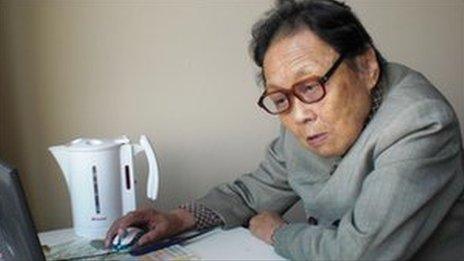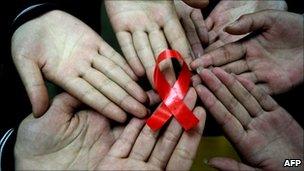Exiled China Aids activist mourns her former life
- Published

Dr Gao has won international awards for her work in treating HIV/Aids patients and raising awareness of the problem in China
A year-and-a-half ago, Gao Yaojie, a celebrated doctor, would have been greeting a steady stream of desperate HIV patients at her old home in central China.
Now she passes her days holed up in a flat in the New York melting pot neighbourhood of West Harlem, writing about China's blood-selling epidemic in three books that she considers her legacy.
"I never go out. All I do, from day to night, is work on my books. I go over pages and pages every day," she says in Mandarin, loudly, in the way those hard of hearing often do.
"I am 84 years old. My goal is to publish them before I die."
Dr Gao is one of China's oldest and most famous dissidents. Fearing for her freedom, she fled the country in 2009, crying all the way.
Home is now a massive public housing complex, where the language spoken is often Spanish.
"If I consider only my living standards, this place is a lot better than my old place in Zhengzhou," she says, gesturing to her newly renovated one-bedroom flat.
"There is even heat when it gets cold! Life is more comfortable here. But I miss my old life and the work I used to do."
The apartment, paid for by charities, seems spacious because it is sparsely furnished.
When Dr Gao left China, she boarded the plane with a few Mao jackets and manuscripts of three books, the culmination of her life's work.
Scandal exposed
For more than a decade, the country doctor, a gynaecologist by training, was at the forefront of Aids activism in China.

Officials say more than 700,000 people are living with HIV in China, but others put the number higher
Known as Grandma Gao, she travelled across the country treating patients, often at her own expense.
But Dr Gao refused to keep quiet about what she found. She believes the vast majority of people infected with HIV in China caught the virus as a result of selling their blood for money.
"You know how many people were infected? Ten million. That includes the number of people who have already died. It's not less than that," she says, her voice rising in anger.
That is far greater than Beijing's official figure of 740,000 people living with HIV. For years, the country denied having such patients.
China's Henan province, where Dr Gao lived, was the centre of a tainted blood scandal in the 1990s. With a huge population and limited industry, Henan residents sold themselves to make a living.
They sold their blood, which was then pooled with blood from other donors into a central collection. The valuable plasma was then separated.
The remainder of the blood, now contaminated with HIV and other viruses, was given back to donors to speed up their recovery so they could give again.
'Underground'
Government officials initially covered up the practice. Many profited directly. As a result, entire villages were devastated by illness.
Dr Gao believes the problem still exists: "It's bigger. It's nationwide, everywhere. I have seen everything with my own eyes. Blood selling is illegal. In the past, it was open and public. Now, it's underground."
Dr Gao treated her first HIV patient in 1996. She also led a campaign for greater openness and transparency. As a result of her efforts, she was recognised at home and abroad for her work.
But in May 2009, after the detention and trial of two other prominent activists, she concluded that her freedom was in danger.
"I got a call from the French embassy, telling me I had won an award," she recalled. "Then my phone line was cut. The last time that happened, I was under house arrest for two weeks.
"I later got information that the government planned to stop me from collecting my award and telling the world what was happening. So, without eating my lunch, I got on a bus to Beijing."
Dr Gao then made her way to the southern province of Guangdong, where she enjoyed the warm weather and company of supporters, before leaving for America and a life in exile.
"When I was young, I could work to the fullest of my ability to serve China. Now that I am old, America is supporting me," she said.
Health worries
Dr Gao spent several months with a Chinese family in small-town America, before being enticed to New York with a visiting fellowship at Columbia University, and a $40,000 (£25,000) annual stipend, courtesy of two charities.
Shortly after her arrival in New York, the problems of old age caught up with the frail, yet feisty, grandmother.
Hearing loss in both ears worsened. She also discovered a blood clot in her leg, restricting her movement.
"There is so much I can't do now," she says, crying at times in frustration over her declining health.
"In the past, I treated patients. I was also teaching, nine classes in one day. It pains me that I am not healthy enough to work like I used to."
Dr Gao receives few visitors. Due to her outspoken activism, she is estranged from her children. Her husband of several decades passed away in 2006.
Mortality is constantly on her mind. "All I think about is that before I die, I am able to leave these painful questions and records with the next generation.
"If I don't, then what has happened to so many people would just be stories. My work is not done. It will never be completed. But I can't do any more."
- Published13 October 2010
- Published28 September 2010